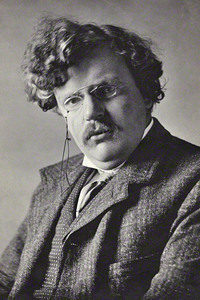G. K. Chesterton 1874—1936
Gilbert Keith Chesterton was an English writer with a prolific and diverse output which included philosophy, ontology, poetry, play writing, journalism, public lecturing and debating, literary and art criticism, biography, Christian apologetics, and fiction, including fantasy and detective fiction. Chesterton has been called the “prince of paradox”. Time magazine, in a review of a biography of Chesterton, observed of his writing style: “Whenever possible Chesterton made his points with popular sayings, proverbs, allegories–first carefully turning them inside out.” (source: Wikipedia)
















